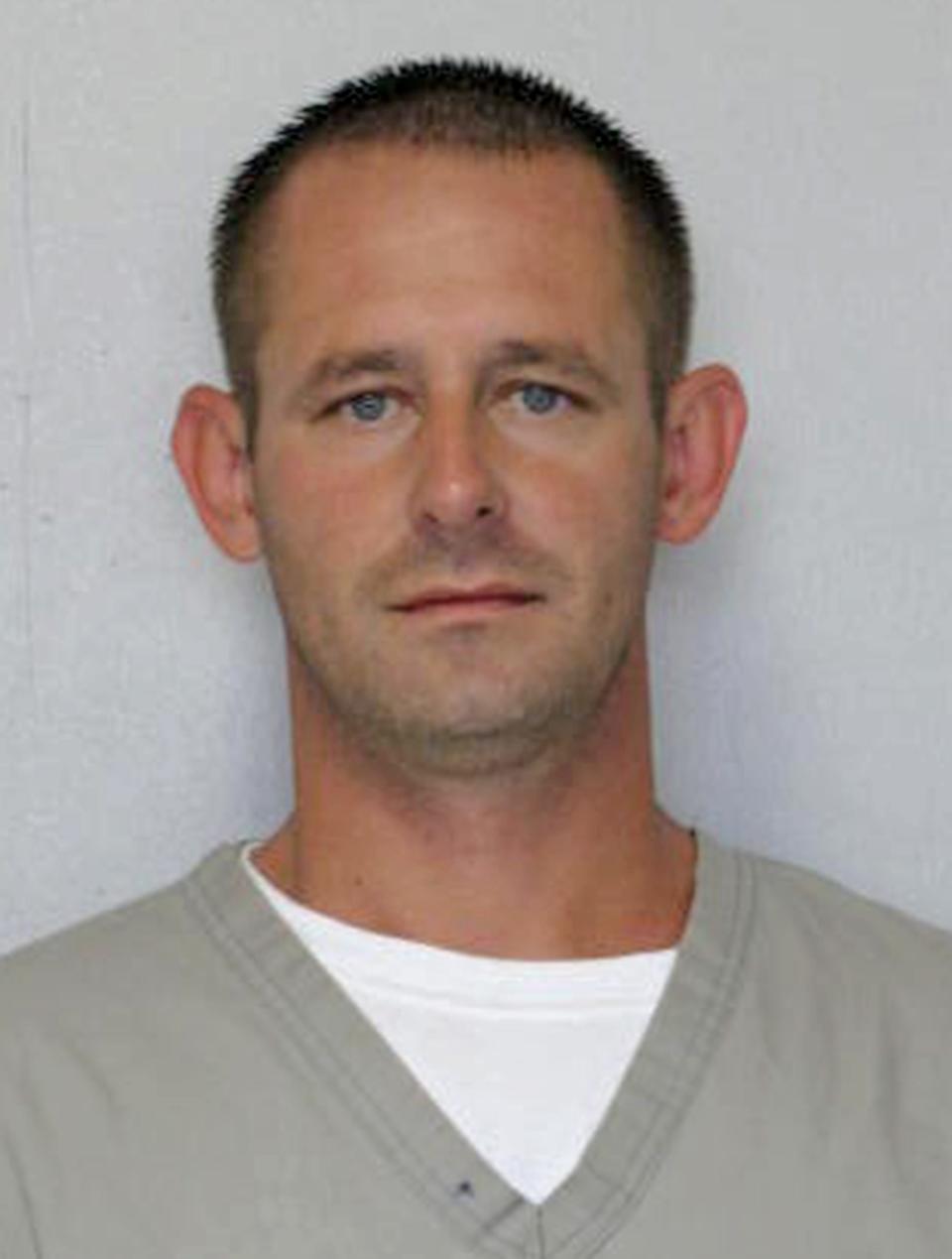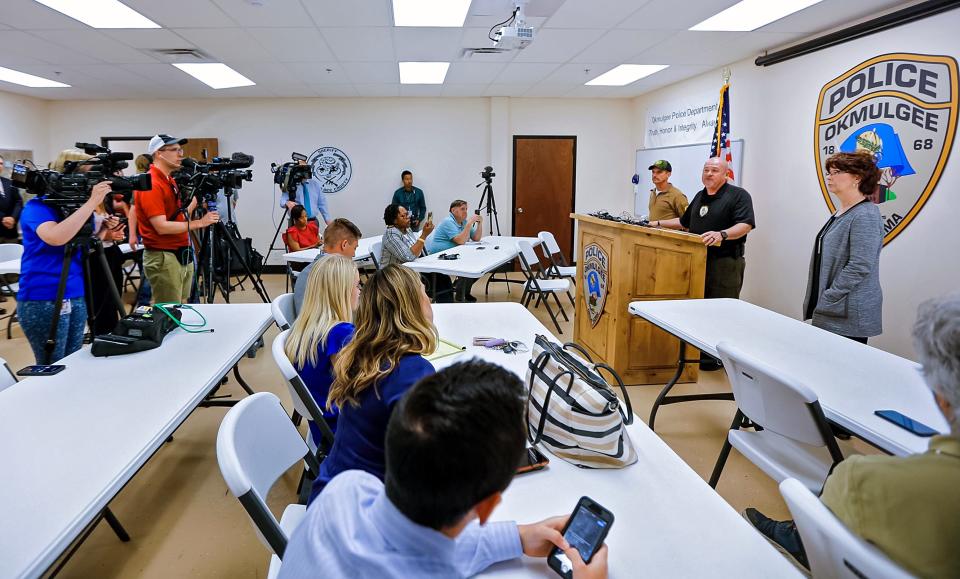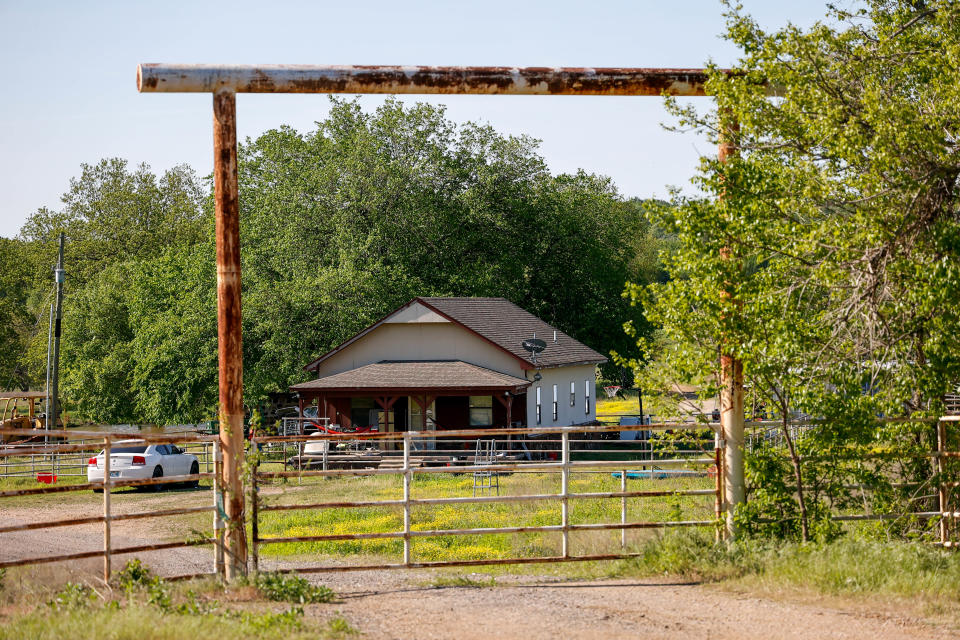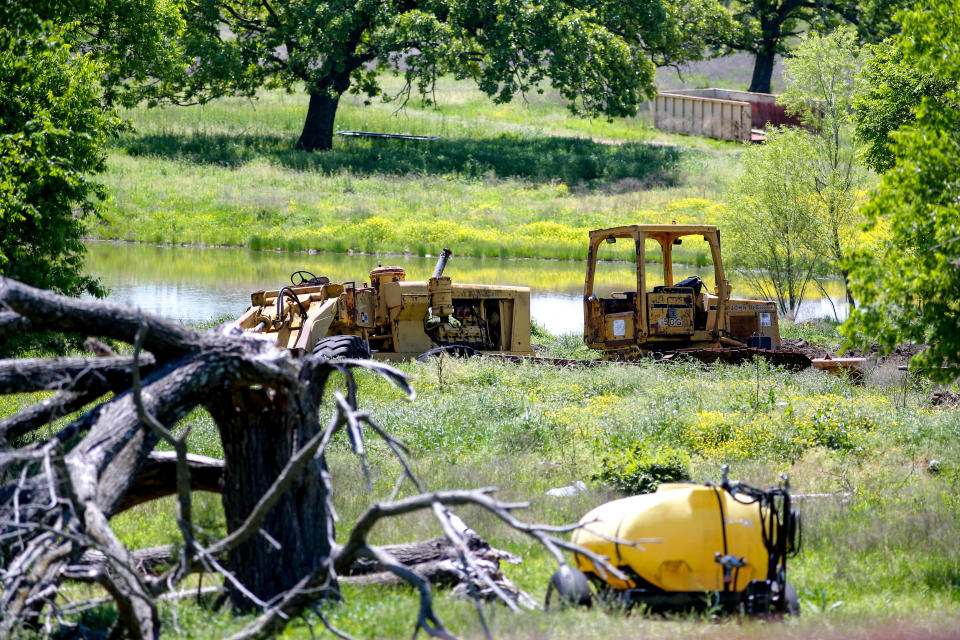'They let a monster out': Questions remain about why convicted rapist remained free
HENRYETTA, Okla. — After the discovery of seven dead bodies, including two missing girls, in this small town of less than 6,000 about 90 miles east of Oklahoma City, questions remain about why the convicted rapist at the center of the grisly crime remained free in the community.
While searching Monday for 14-year-old Ivy Webster and 15-year-old Brittany Brewer, both of Henryetta, the Okmulgee County sheriff's office found the girls dead at a rural property, along with 39-year-old convicted sex offender Jesse McFadden and four other victims.
On Wednesday, authorities identified the other four victims as his wife, Holly Guess, 35, and her children, Rylee Elizabeth Allen, 17; Michael James Mayo, 15; and Tiffany Dore Guess, 13.
Authorities said McFadden shot his victims in the head, some two or three times, before turning the weapon on himself.
7 bodies found Oklahoma police confirm sex offender fatally shot 6, then killed self

The victims' bodies were found near a creek and in a heavily wooded area.
Court records show McFadden was due Monday in Muskogee County District Court for a jury trial on one count of soliciting sexual conduct with a minor by use of technology and one count of possession of child pornography.
Records show McFadden was accused of the crimes while he was a state prisoner serving a 20-year sentence for first-degree rape, which he was convicted of in 2003.
He was accused of using a contraband cellphone to communicate with a 16-year-old girl while in state prison near Muskogee in 2017.
McFadden had done time for rape conviction, and was released from prison
McFadden was discharged from state prison in October 2020. In Oklahoma, those who commit violent felonies are required to serve at least 85% of their sentence.
Upon release from state prison, McFadden was arrested and placed into the Muskogee County jail from Nov. 13 to Nov. 17, 2020, according to records.

McFadden was released from jail on a $25,000 bond as his latest case wound its way through court. The case faced numerous delays.
More than five years after his latest charges were filed, McFadden failed to appear in court Monday. The judge issued a bench warrant for his arrest.
It was then that authorities visited his property and discovered the grisly scene.
'It's systemic failure': Oklahoma legal protocol under scrutiny
McFadden’s early release from prison, his bond release from county jail, and the length of his trial have come under scrutiny from those who question how a convicted rapist with child pornography charges was allowed in the community.
Brett Chapman, a Tulsa-based criminal defense attorney and former prosecutor for the Tulsa County district attorney’s office, reviewed McFadden's criminal history.
The state should have prosecuted McFadden while he was in prison, Chapman said. And, the pandemic was no excuse for court delays, because it arose more than two years after McFadden’s case was filed.
“What we’re seeing here is a complete and utter failure of the state of Oklahoma’s criminal justice system, and what we need to know is how widespread is this,” Chapman said. “There needs to be a review of everything that happened here because this was a failure of the state judiciary system. They got those people killed.”

There must have been numerous points in the case where someone could have stepped in to speed up the process, Chapman said.
“It is a system failure,” Chapman said. “The system goes much farther than this one district attorney’s office. It all boils down to a failure. It was a complete failure.”
Justin Webster, father of Ivy Webster, echoed those remarks in comments to The Associated Press.
“The sexual (offender) registry doesn’t work,” he said. “I think there needs to be action taken. There needs to be repercussions, and someone needs to be held accountable. They let a monster out. They did this.”
While some say the delayed case was unusual, others said they were not surprised it took as long as it did to get McFadden to trial.
'Everything slowed down'
On Monday morning, McFadden was reported by Oklahoma Highway Patrol to possibly be with teens Ivy Webster and Brittany Brewer,
By the end of the day, when investigators announced the gruesome discovery of dead bodies, McFadden’s dark criminal history came to public light.
Ryan Ferguson, a criminal defense attorney and former prosecutor in the Muskogee County district attorney's office who represented the state in a November 2017 hearing for the McFadden case, before leaving the office a month later, said the case was an outlier.
Ferguson believes the November 2020 death of McFadden defense attorney Donn Baker delayed the case, as well as the COVID-19 pandemic.
“The courts slowed down just organically due to COVID, everything slowed down,” he said.

Dan Medlock, a criminal defense attorney in Muskogee who worked as a prosecutor in the Muskogee County district attorney’s office until March, and who represented the state at a disposition docket hearing on the McFadden case in December 2021, said the court delays were not unusual.
In Muskogee County, he said, it is rare for a case to go to trial on the first or second jury sounding docket.
Resources are the main factor, he said.
“It’s a lack of not having enough judges to be able to try the cases quick enough,” Medlock said. “People who are in local jail are going to take priority. It’s mainly they have to prioritize which cases go first.”
McFadden’s $25,000 bond is fairly standard in Muskogee County, he said.
More: Seven bodies were found in Okmulgee County on Monday. The grieving families want answers.
No-bond cases involve murder, violent felonies where somebody has been shot or stabbed, or crimes involving severe bodily injury.
“Anything less than that, it’s hard to get a no bond unless they are a flight risk,” Medlock said.
Muskogee County District Attorney Larry Edwards did not return messages regarding McFadden’s 2017 case. An Oklahoma Department of Corrections spokeswoman did not immediately respond to an email Wednesday seeking comment on why McFadden was released from prison while facing felony charges.
Ed Blau, a criminal defense attorney in Oklahoma City, has followed the case closely since Monday’s deadly event unfolded.
“Any time you've got a new felony case while somebody is incarcerated it’s going to be at the bottom of the priority list,” he said. “The person is already in custody. They’re not going anywhere ... the prosecutor, the judge, they're not going to bend over to make that a fast process.”
Also, Blau said, in small counties like Muskogee, judges, defense attorneys and prosecutors are typically overwhelmed with cases. Murders and other violent crimes take priority, he said.
“There’s nothing particularly nefarious about this,” Blau said. “If the Legislature wants to appropriate sufficient resources to increase the number of and pay of prosecutors, public defenders and increase the number of judges, and add the necessary resources, theoretically things can go faster, but until that happens this is how long it takes.”
Chapman, the Tulsa-based lawyer, disagrees. He said he’s seen higher bond amounts issued for drug offenses.
“This is a real problem, and I think that this guy laid it all bare,” he said. “And I think the public deserves to know and find answers.”
Remembering the victims: What we know about the victims, including two teens, found dead in Henryetta
Brittany Brewer's father visits scene
Nathan Brewer went to both the home and the scene the bodies were found early Wednesday afternoon. Brewer said it was “horrific” and no parent should have to see what he saw, including the knee-high grass that was flattened from where the bodies lay.
“It was bad, but it helps me have closure,” Brewer said. “Just seeing and then going up to the scene where the bodies were found, I felt a piece of Brittany there and I told her it’s time to come home. I just feel like … she was trapped over there.”
Brewer said things he saw inside the home were reminiscent of an episode of "Criminal Minds," including a back room with locks, chains and cameras, though he wouldn’t go into much detail.

Brewer said his daughter never mentioned feeling uncomfortable at the home or around McFadden. She had spent the night at their home several times, and McFadden himself picked Brittany up from her home around noon Saturday. That’s the last Brewer saw his daughter.
“You would have thought our daughters would have said something if they knew something about this from being over there,” Brewer said. “You would have thought so. I'm pretty sure she would have said something.”
Department of Corrections issues statement
Late Wednesday, a spokeswoman for the Oklahoma Department of Corrections issued a statement about McFadden’s sentence and release. McFadden was received into prison custody in January 2004.
“Per state statute, for his conviction, McFadden had to serve no less than 85% of his sentence, which is a minimum of 17 years,” spokeswoman Kay Thompson said. “Inmates are given credit for time served within county jails, which in his case was 76 days, moving his release date to Oct. 30, 2020.”
Thompson said McFadden was a Level 4 inmate for most of his incarceration, however, he was assigned to Level 1 in January 2017 following his misconduct occurring for possessing a contraband cellphone. He returned to Level 4 “through the proper steps” in June 2017 through the end of his incarceration,” Thompson said.
When McFadden reached his 85% date, his banked credits were applied and he was released, she said.
McFadden was to register as a sex offender.
He was given no probation, but because he was a lifetime registrant, he had to check in every 90 days with the sheriff’s office, Thompson said.
“He was compliant with this stipulation,” she said. “Registered sex offenders are allowed to live with their own children and stepchildren as long as they are not a victim of the offender. However, they are supposed to notify the Oklahoma Department of Human Services if they do. Sex offenders are not required to notify neighbors of their registration status.”
The Oklahoman's Molly Young, Jessie Christopher Smith and Jana Hayes contributed to this report.
This article originally appeared on USA TODAY NETWORK: In Oklahoma, questions remain on why Jesse McFadden was not in custody

